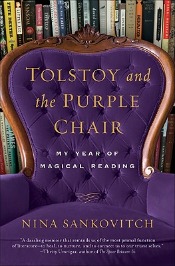At this moment, I can’t think of anything more luxurious than sitting down to read a book a day for an entire year. Can you imagine waking up each morning with the goal of finishing a book, and having that goal be the driving motivation of your day? Amazing.
The idea has been in my head since Sunday when I finished reading Nina Sankovitch’s memoir Tolstoy and the Purple Chair, which is about her project to read 365 books in 365 days. This project wasn’t just for kicks: after her sister, Anne-Marie, passed away after a short illness at 46, Sankovitch found herself split apart — one part stuck back in the hospital room with her sister and one part rushing forward, trying to live as much as possible as a way to make Anne-Marie’s death mean something. As a way to center herself, to find a way back to actually living, Sankovitch decided to spend a year in immersed in books, reading and reviewing a book every single day.
For a short book, Tolstoy and the Purple Chair gave me a lot to think about. Rather than just writing a chronicle of “my year in books,” Sankovitch uses her year of reading to explore what books mean to readers and how we use the greater truths that can be found through the written word to inform and live our own lives. The chapters are arrange thematically, and Sankovitch draws together books that seem to have nothing in common as she works through her year of reading.
One phenomenon Sankovitch explored was the idea of recommending books to others. As she started her “year of magical reading” — a great reference to Joan Didion’s memoir, The Year of Magical Thinking — Sankovitch found herself inundated with recommendations for books to read from other people. “Take this,” they’d say, “I think you’ll love it.” However, this brings about some complications:
People share books they love. They want to spread to friends and family the goodness that they felt when reading the book of the ideas they found in the pages. In sharing a loved book, a reader is trying to share the same excitement, pleasure, chills and thrills of reading that they themselves experienced. Why else share? Sharing a love of books and of one particular book is a good thing. But it is also a tricky maneuver, for both sides. The giver of the book is not exactly ripping open her soul for a free look, but when she hands over the book with the comment that it is one of her favorites, such an admission is very close to the baring of the soul. We are what we love to read, and when we admit to loving a book, we admit that the book represents some aspect of ourselves truly, whether it is that we are suckers for romance or pining for adventure or secretly fascinated by crime.
As a person who constantly recommends books — both online and to friends and family — I’m really curious about this idea. Does recommending books really have this much weight? Is a book recommendation really putting your soul out there for others to see?
[continue reading…]









 Monday Tally is a weekly link round-up of some of my favorite posts discovered over the week. If you have suggestions for Monday Tally, please e-mail sophisticated [dot] dorkiness [at] gmail [dot] com. Enjoy!
Monday Tally is a weekly link round-up of some of my favorite posts discovered over the week. If you have suggestions for Monday Tally, please e-mail sophisticated [dot] dorkiness [at] gmail [dot] com. Enjoy!
 Two summers ago, my sister Jenny and I did
Two summers ago, my sister Jenny and I did